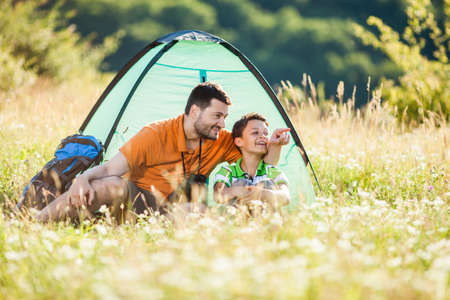Introduction to Nature-Based Activities at UK Campsites
When it comes to family adventures in the great British outdoors, few experiences rival the hands-on learning and rugged fun of gardening and foraging with children at campsites. In the UK, these nature-based activities are more than just pastimes; they are part of a rich tradition that honours the countryside, instilling essential values and practical skills in young explorers. Whether you’re pitching your tent in the Lake District, the Scottish Highlands, or along the Cornish coast, encouraging kids to dig into the soil or forage for wild edibles fosters a deep respect for local landscapes and wildlife. These activities not only teach children about native plants and sustainable living but also help them develop resilience, curiosity, and a sense of responsibility for their environment. British campsites offer a unique blend of habitats—ancient woodlands, meadows, moorlands, and hedgerows—that provide perfect opportunities for immersive learning. By engaging youngsters in gardening and foraging, families embrace a slower pace of life rooted in local culture and countryside etiquette, ensuring that every camping trip becomes an unforgettable journey back to nature.
Essentials for Outdoor Gardening with Kids
Gardening at UK campsites is more than just planting seeds – it’s an immersive, hands-on adventure that teaches children about sustainability and respect for the natural world. Whether you’re on a windswept Cornish coast or nestled in the Lake District, having the right kit makes all the difference. This section covers the essential tools, safety gear, and eco-friendly supplies every family should pack, along with hard-earned tips to keep kids engaged and the land thriving.
Key Tools for Campsite Gardening
| Tool | Purpose | Kid-Friendly Tip |
|---|---|---|
| Trowel & Hand Fork | Planting, digging, weeding | Choose lightweight, child-sized versions with rounded edges |
| Watering Can (small) | Gentle watering without soil erosion | Opt for bright colours so children can easily spot them around camp |
| Gardening Gloves | Protects little hands from thorns and nettles | Pick gloves with fun patterns to encourage use |
| Buckets & Trugs | Collecting weeds, soil, or harvested goods | Let kids personalise their buckets with stickers or names |
| Kneeling Pad | Cushion knees on rough ground | Use foam pads which are easy to clean after muddy sessions |
Safety Gear: Non-Negotiables for Peace of Mind
- Sturdy footwear: Wellies or boots protect feet from sharp stones and insects.
- Sun hats and waterproofs: British weather is unpredictable—prepare for both drizzle and sun.
- Sensitive-skin sunscreen: Even cloudy days can catch you out in the open field.
- Nettle-proof trousers: Long sleeves and legs shield against brambles and stings.
- First aid kit: Always within arm’s reach; include plasters, antiseptic wipes, and tweezers for thorns.
Eco-Friendly Supplies: Leave No Trace Principles
- Biodegradable plant pots: Avoid plastic—opt for coir or cardboard alternatives.
- Organic seeds: Native UK varieties support local pollinators and ecosystems.
- Naturally sourced compost: Bring your own peat-free mix if site regulations allow.
- Cotton or jute twine: For tying up plants—compostable and gentle on nature.
- No chemical sprays: Teach kids to hand-pick pests or make safe deterrents using household items like garlic spray.
Tactics for Involving Children in Every Step
- Create mini-responsibilities: Assign tasks such as watering or weed-spotting to foster ownership.
- Name that plant: Turn identification into a game—who can spot the most wildflowers?
- Praise stewardship: Celebrate careful handling of wildlife and respectful harvesting of edible plants.
- Sow curiosity, not just seeds: Encourage questions about bugs, birds, and why some plants thrive while others struggle in the British climate.
- Muck in together: Set an example by getting your own hands dirty—kids will follow suit when they see your enthusiasm.
The Hard Rules: Respect for Land and Wildlife
The UK countryside operates under a strict code of respect. Remind young gardeners never to dig up rare plants, disturb animal habitats, or leave rubbish behind. Stick to marked campsite areas for gardening activities unless granted permission by wardens. Practise “leave no trace” ethics—pack out everything you bring in, leaving wild spaces as you found them or better. Through hands-on learning, children become guardians of Britain’s green heritage, one seed at a time.

3. Foraging the British Way: Common Edible Plants and Safety
Heading out into the wild with your kids isn’t just about adventure – it’s about understanding what Britain’s countryside has to offer. The UK is home to a bounty of edible plants, but knowledge and respect for nature are crucial. Here’s a hard-nosed guide for campsite families keen to forage safely and responsibly.
Spotting the Essentials: What to Forage
If you’re camping in woodlands or hedgerows, keep an eye out for blackberries – these tough little fruits are a late summer classic, easily identified by their dark purple hue and bramble thorns. Wild garlic flourishes in shady spots from March to May; its broad green leaves and pungent scent make it unmistakable. Elderflower, meanwhile, appears in creamy clusters in early summer – perfect for cordials if picked with care.
Legal Considerations and Right to Roam
Britain’s ‘Right to Roam’ means you can walk across open land, but don’t mistake that for free-for-all foraging. By law, you may pick wild flowers, fruit, nuts, and fungi for personal use on public land, but never uproot plants without permission. Private land remains off-limits unless the owner grants access. Always be aware of local bylaws or site-specific rules at your campsite.
Safe Foraging: No-Nonsense Rules
Never eat anything unless you’re 100% certain of its identity – many poisonous species mimic edible ones. Teach children not to taste-test without adult confirmation. Harvest only what you need and leave enough for wildlife and fellow campers. Use a sturdy container (not plastic bags) to prevent bruising your finds. Above all, respect the landscape: tread lightly, avoid damaging habitats, and leave no trace of your activity.
Foraging with kids at UK campsites builds bushcraft confidence and connects them to the land – as long as everyone sticks to safe, sustainable practices rooted in local law and respect for nature.
4. Simple and Engaging Gardening Projects for Children
Introducing children to gardening at UK campsites is a brilliant way to spark curiosity about the natural world while providing hands-on learning. Here are some step-by-step projects tailored for young campers, using materials easily sourced from around the site or brought from home. These activities are designed for safety, engagement, and minimal environmental impact.
Mini Wildflower Patch: Bring Colour and Wildlife to Your Pitch
Materials Needed:
| Item | Description |
|---|---|
| Wildflower seeds (native UK varieties) | Look for bee-friendly mixes at local garden centres |
| Small trowel or sturdy spoon | For digging shallow holes |
| Recycled container lid or cardboard sheet | To mark out the patch area |
| Water bottle with holes in cap | Makeshift watering can for gentle watering |
Instructions:
- Select a patch of bare ground near your tent but away from heavy foot traffic.
- Use the container lid or cardboard to outline a small circle or square (about 30cm across).
- With the trowel, lightly loosen the top layer of soil—just a couple of centimetres deep will do.
- Sow wildflower seeds evenly over the area, following packet instructions for spacing.
- Gently pat down the soil with your hands to help seeds make contact.
- Water lightly using your improvised watering can, taking care not to flood the seeds.
- Place a small marker (like a stick) so campers remember where it’s planted. Return in future visits to see how it’s grown!
Herb Growing in Recycled Containers: Sustainable Flavours On-site
Materials Needed:
| Item | Description |
|---|---|
| Cleansed yoghurt pots or tin cans (with drainage holes) | Saves on packing and encourages upcycling habits |
| Multi-purpose compost or local soil (if suitable) | A small bag is enough for several containers |
| Herb seeds (basil, chives, parsley etc.) or starter plugs | Select hardy varieties that grow well in UK climates |
| Spoon or small trowel | For filling containers with soil/compost |
| Water spray bottle or makeshift watering can | Easier for children to manage than large watering cans |
Instructions:
- Poke drainage holes in the bottom of your chosen container using a pen or screwdriver (adults should supervise this step).
- Add compost or soil until the container is three-quarters full.
- If using seeds, sprinkle them thinly over the surface; if using starter plugs, gently plant them into the centre.
- Add a little more soil on top and pat down gently.
- Mist with water – avoid overwatering as herbs dislike soggy roots.
- Position your herb pots somewhere safe but sunny at your campsite. Remember to check moisture daily and harvest leaves together as needed for meals.
Tough Tips for Outdoor Success:
- Encourage kids to take turns checking their patches or pots each morning; responsibility builds confidence and observation skills.
- If you move campsites often, choose portable projects like container herbs that travel easily in a rucksack or car boot.
- Praise patience—plants won’t grow overnight. Make regular observations part of your camping routine to keep kids engaged with nature’s pace.
This hands-on approach gives young adventurers practical survival skills rooted in respect for Britain’s wild places—fostering both knowledge and appreciation for local ecosystems with every seed sown and sprout tended.
5. Making the Most of a British Campsite: Local Tips and Etiquette
Embracing the wild side of the UK with your kids means more than just having fun—it’s about preserving these green havens for future generations. Respecting local wildlife is paramount; always observe animals from a distance, avoid feeding them, and teach children to tread quietly so as not to disturb nesting birds or shy woodland creatures. Stick to designated paths during foraging and gardening activities, as trampling undergrowth can damage fragile habitats. When interacting with fellow campers, remember that good manners are part of British outdoor culture—say hello to your neighbours, keep noise down after dusk, and share communal facilities considerately.
The Leave No Trace principles are gospel in UK campsites. Always take your litter home, even biodegradable waste like fruit peels, and ensure any fire or barbecue is permitted and safely extinguished. Involve children in tidying up your pitch; it’s both educational and respectful. Water sources should be treated with care—never use soap or detergents directly in streams or lakes. Traditional campsite customs run deep: pitch your tent at a considerate distance from others unless otherwise directed, and if you borrow tools from site managers or other campers, return them promptly with thanks. The British value self-reliance but will always lend a hand if you’re in trouble—just ask politely.
Above all, camping in the UK is about blending into the landscape rather than conquering it. Teach kids to leave wildflowers unpicked so others may enjoy them, and remind them that fallen branches are fair game for crafts or campfires—but never break living limbs. By following these time-honoured customs and embracing outdoor etiquette, you’ll help ensure that both nature and community thrive long after your tent comes down.
6. Turning Harvests into Campfire Feasts
After a day spent exploring hedgerows, digging in the earth, and gathering wild treasures with your kids, the real magic unfolds when you transform those harvests into delicious campfire feasts. At UK campsites, there’s something primal and satisfying about cooking outdoors—especially when you know you’ve foraged or grown the ingredients yourself. Here are some hardy, family-friendly ideas to turn your bounty into healthy snacks and classic British treats.
Simple Campfire Recipes for Foraged Finds
Let’s start with the basics: wild blackberries, apples from a campsite orchard, or even freshly picked nettles can all be turned into hearty fare with minimal fuss. The key is to keep recipes simple and let the natural flavours shine through, while still giving kids a hands-on experience around the fire.
Blackberry Crumble in a Mess Tin
This camp classic needs only a handful of ingredients: blackberries (foraged or brought along), oats, plain flour, butter (or a vegan alternative), and a sprinkle of brown sugar. Mix the fruit with a dash of sugar in your mess tin, then rub together flour, oats, butter, and more sugar for the topping. Place on the edge of hot coals and let it bake until bubbling and golden—a treat that celebrates the best of British hedgerows.
Nettle Soup: A Wild Green Powerhouse
Nettles are packed with nutrients and easy to identify. With gloves on, gather young nettle tops. At camp, sauté an onion in a pot over the fire, add diced potato or carrot for bulk, then toss in washed nettles. Cover with water or stock and simmer until tender. Blend if you have a hand blender or just mash gently; season well. Serve with chunks of crusty bread for a nourishing supper that’s pure wilderness Britain.
Other Easy Ideas for Kids
- Wild Herb Flatbreads: Mix flour and water into a dough, knead in chopped wild garlic or rosemary from your garden patch, flatten, and cook on a hot stone or skillet.
- Apple & Bramble Skewers: Thread slices of apple and blackberry onto sticks and toast lightly over embers for a simple pudding.
- Dandelion Fritters: Dip washed dandelion flowers in batter and fry over the fire for crunchy snacks.
Tough Tips for Safe Outdoor Cooking
Always supervise children near flames and teach them proper fire safety—keep water nearby, use long-handled utensils, and never leave fires unattended. Make sure all wild plants are correctly identified before eating; when in doubt, leave it out. With these precautions—and a bit of rugged determination—you’ll find that turning your harvest into real food becomes one of the most rewarding parts of any UK camping adventure.


